Computer Engineering Department
About the Department of Computer Engineering
Computer Engineering is a branch of engineering that includes the applications of algorithmic processes encountered in the field of hardware and software. It also provides solutions to problems encountered in technological, economic, scientific and social fields. There are four main areas in which students are trained in this discipline: theory, abstraction, design and practice. Theory provides the mathematical and scientific background of computing. Abstraction involves the principles of modeling algorithms, data structures, hardware architecture. Design and practice refers to the use of tools and theory necessary for the development of hardware-software systems. These tools include programming languages, databases, network protocols, client/server architecture, artificial intelligence, etc.
Computer Engineering programs include courses in basic sciences, basic engineering, social sciences and computer science. The foundation of Computer Engineering is provided by courses in theory, programming, computer organization, numerical design, numerical analysis, algorithms and data structures. In advanced classes, operating systems design, database applications, computer graphics, computer architecture, microprocessors, programming languages, object-oriented programming methods and software engineering are covered. Final year students combine their creativity, knowledge and motivation with the latest technology to prepare a final project.
You can review this page for Yeditepe University Faculty of Engineering Computer Engineering Department YKS quotas, base points and success ranking.
You can review this page for the 2024 - 2025 academic year tuition fees of Yeditepe University Faculty of Engineering, Department of Computer Engineering.
The Department of Computer Engineering offers scholarships to students who are successful in ranking and scoring. Here you can get information about both the scholarship programs of the department and the general scholarship opportunities of Yeditepe University.
The Department of Computer Engineering of our university aims to train computer engineers who have knowledge in the fields of science and mathematics as well as computer engineering and who can use the theoretical and practical knowledge they have received during their undergraduate education to solve problems by transferring them to the field of engineering. At the same time, engineering students should be aware of the global security and environmental impacts of these applications.
Our department, which has been continuously accredited by the European accreditation body MÜDEK (Association for Evaluation and Accreditation of Engineering Education Programs) since 2008, provides education in accordance with international standards. In this sense, students are given theoretical and practical training on computer networks, hardware basics and software, and thanks to the 8 general purpose and 10 special purpose laboratories within the department, students can conduct research and develop projects according to their fields of interest.
Students who can double major in many different undergraduate programs can receive a second diploma. In this sense, graduates of our department have the opportunity to work in different sectors as well as computer engineering.
Our department produced a total of 1355 graduates between 2000-2025.
Continuation of Graduates to Graduate Studies
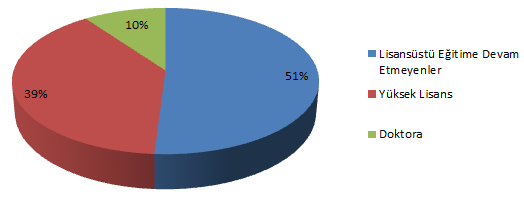
Academic Graduates
Examples of the universities whereour graduates received graduate educationabroad (click on it to see a larger version):
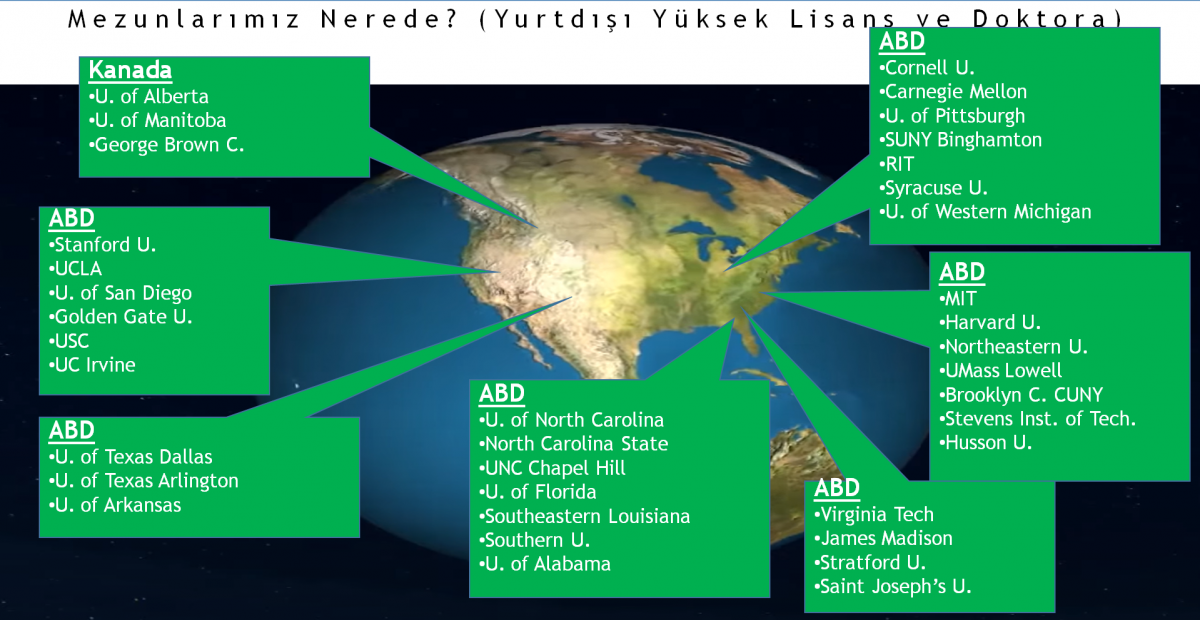
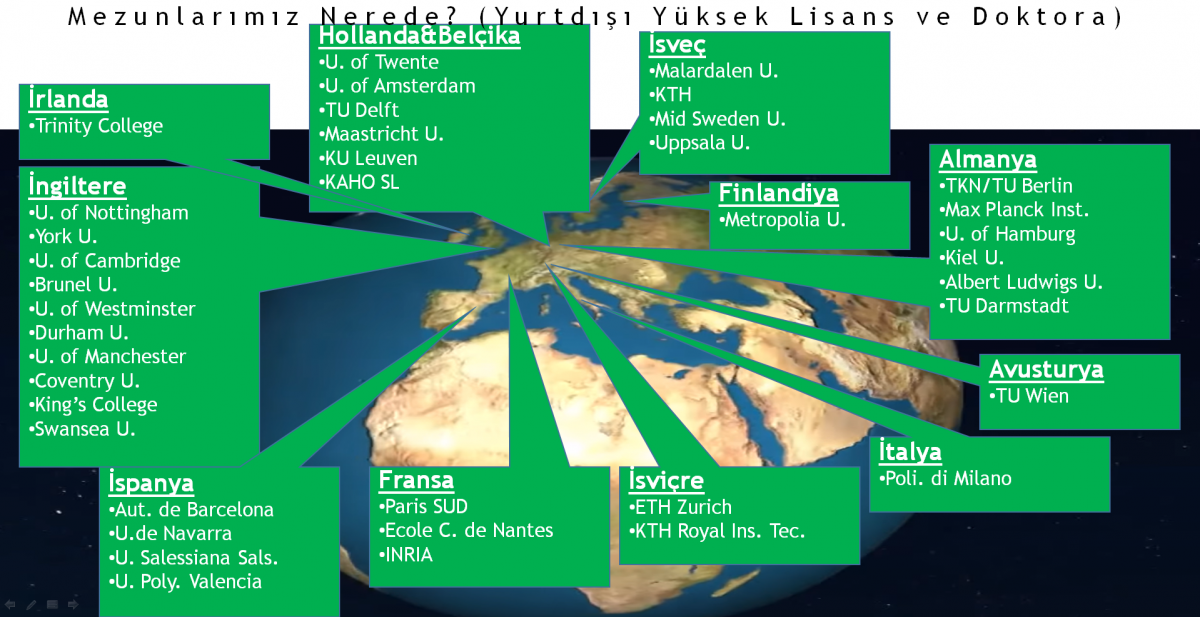

Sectoral Distribution of Our Graduates
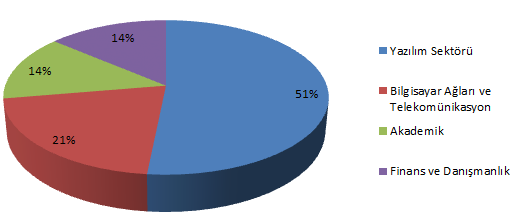
Employment Process of Our Graduates
According to the results of the surveys prepared within the framework of the requirements of Engineering (MÜDEK) accreditation and answered by our graduates participating in the graduate-student meetings, our graduates do not have any difficulty in finding a job after graduation. The graph below is based on the responses of our graduates to the question "Have you ever been unemployed after graduation?"
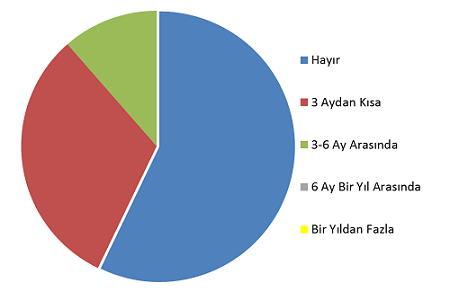
Careers of Our Graduates
Examples of companies where our graduates have worked abroad (click on the image to see a larger version):
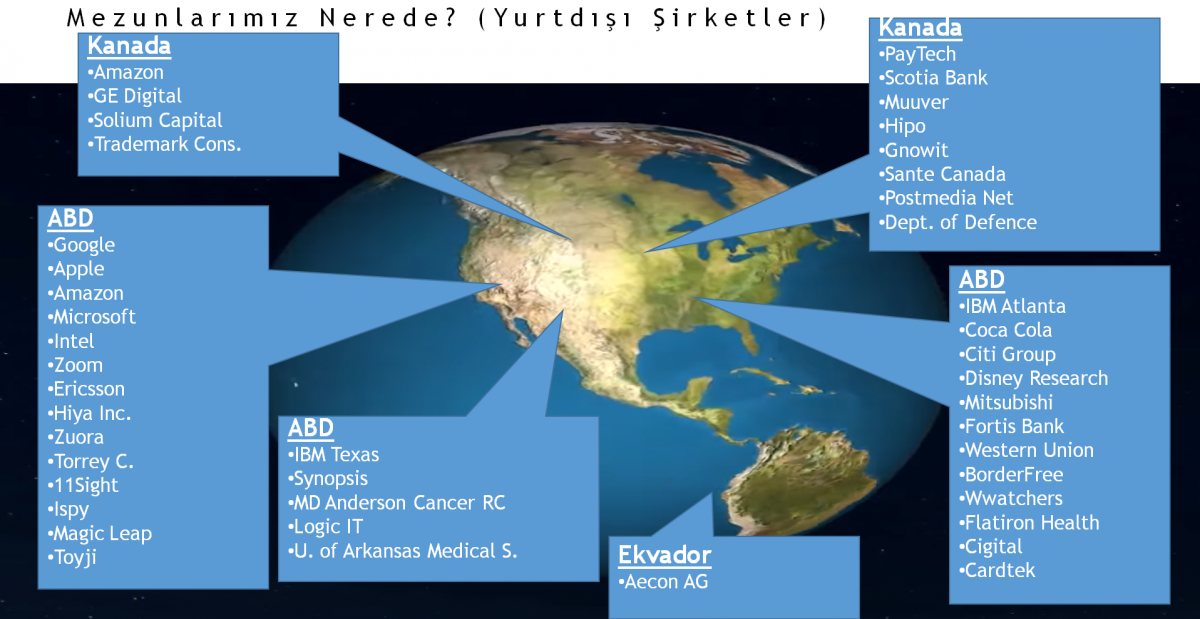
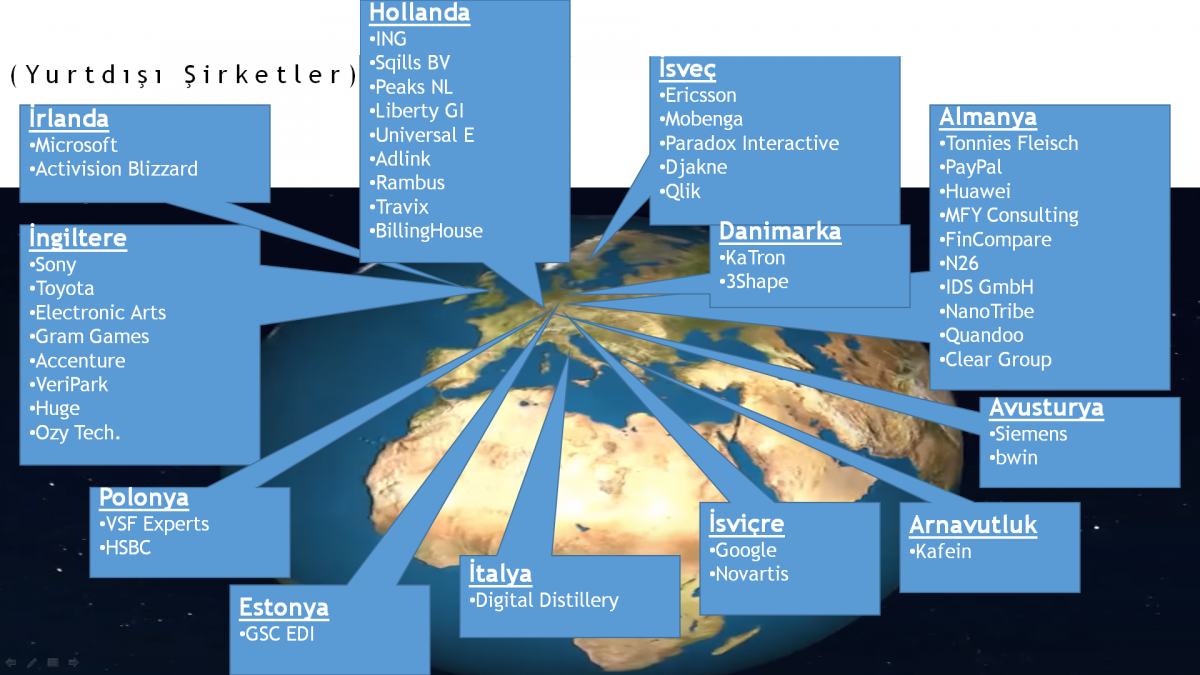

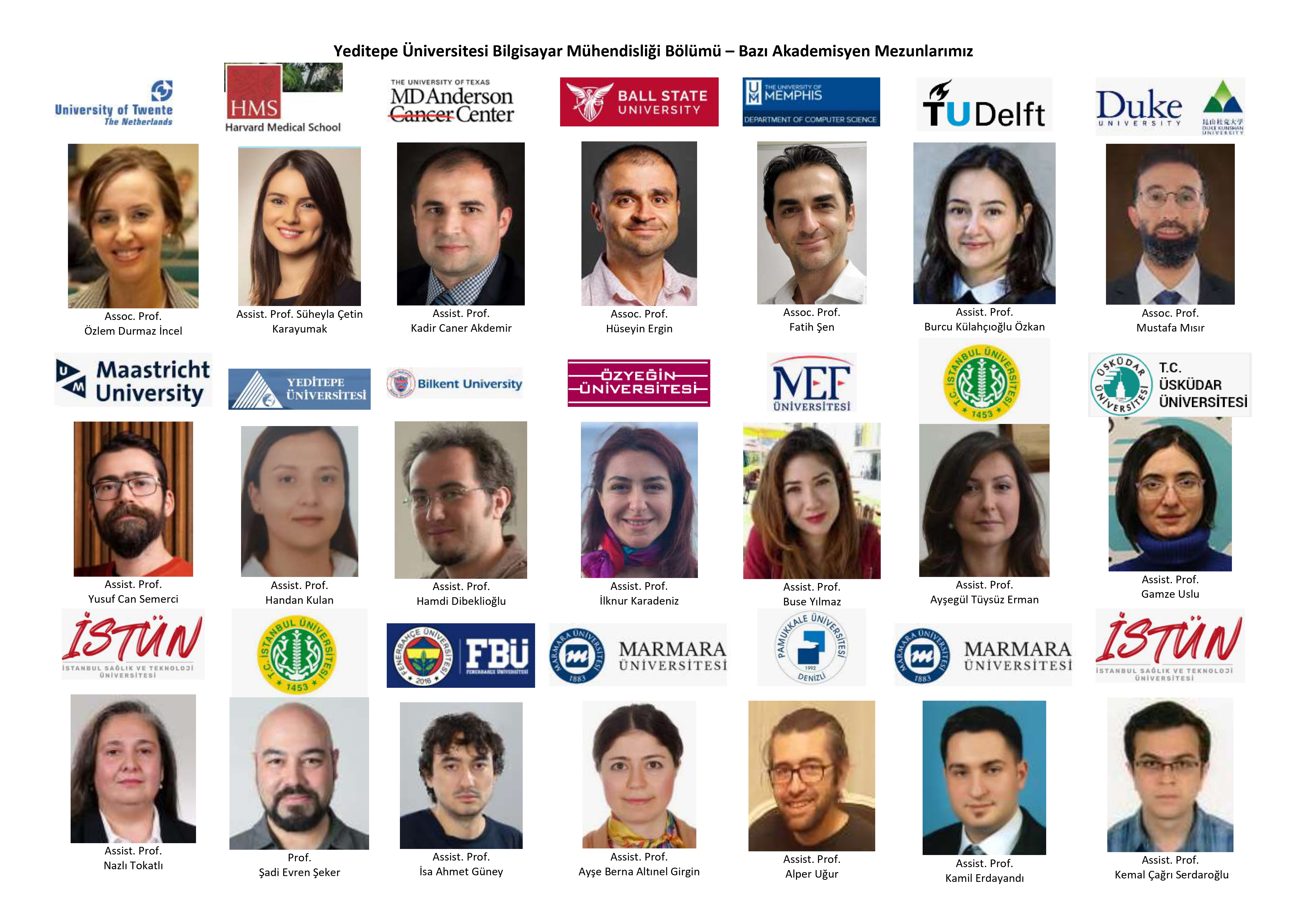
Vision
To be the top ranked computer engineering department in the world with world-renowned scientists and equipped with advanced research laboratories and to train world-class scientists.
Mission
To conduct research with a rich academic staff specialized in their subjects and to train world-renowned computer engineers who are capable of solving engineering problems with systematic methods, who can keep up with rapidly developing technologies, who are prone to interdisciplinary teamwork, and who are free from the phenomenon of being taught.
Undergraduate Education Objectives
Our Graduates
- Technically qualified engineers who are open to research and innovation.
- Demonstrate competence in both software and hardware.
- Should be able to take responsibility and have a sense of professionalism.
Undergraduate Program Outcomes
|
1 |
Adequate knowledge in mathematics, science and computer engineering discipline-specific subjects; ability to use theoretical and applied knowledge in these areas to solve complex engineering problems. |
|
2 |
Ability to identify, formulate and solve complex computer engineering problems; ability to select and apply appropriate analysis and modeling methods for this purpose. |
|
3 |
Ability to design a complex system, process, device or product under realistic constraints and conditions to meet specific requirements; ability to apply modern design methods for this purpose. |
|
4 |
Ability to select and use modern techniques and tools needed for analysis and solution of complex problems encountered in computer engineering applications; ability to use information technologies effectively. |
|
5 |
Ability to design experiments, conduct experiments, collect data, analyze and interpret results for the investigation of complex computer engineering problems or discipline-specific research topics. |
|
6 |
Ability to work effectively in disciplinary and multidisciplinary teams; ability to work individually. |
|
7 |
Ability to communicate effectively both orally and in writing; knowledge of at least one foreign language; ability to write effective reports and understand written reports, prepare design and production reports, make effective presentations, give and receive clear and understandable instructions. |
|
8 |
Awareness of the necessity of lifelong learning; the ability to access information, to follow developments in science and technology and to continuously renew oneself. |
|
9 |
Knowledge about acting in accordance with ethical principles, professional and ethical responsibility and standards used in engineering practices. |
|
10 |
Knowledge about business life practices such as project management, risk management and change management; awareness of entrepreneurship, innovation; knowledge about sustainable development. |
|
11 |
Knowledge about the global and societal effects of computer engineering applications on health, environment and safety and contemporary issues reflected in the field of computer engineering; Awareness of the legal consequences of computer engineering solutions. |
Our undergraduate program is accredited by the Association for Evaluation and Accreditation of Engineering Education Programs (MÜDEK).
About Learning Process
In our university, three types of transfer are possible: Intra-institutional, Inter-institutional According to Grade Point Average and According to Central Placement Score.
In-house transfers can be made to any undergraduate program within the university, provided that they meet the transfer requirements announced every year. Transfer cannot be made in the first two semesters and the last two semesters of undergraduate programs. In order to apply for transfer between undergraduate programs, the student's central placement score in the score type valid for the undergraduate program he / she wants to transfer as of the year he / she took the central exam is not less than the lowest score of the undergraduate programs of other universities in the country equivalent to the undergraduate program he / she wants to transfer.
